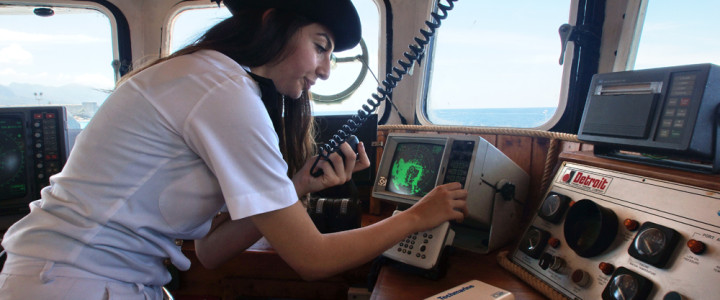
Objective and Mission
The mission of the Department of Maritime Transportation Management Engineering is to provide quality education and equip the students with cutting-edge knowledge and skills required for ensuring the safe navigation and the management of the ship. To this end, the department has set it as its objective to become the lynchpin of education on maritime transportation management by offering the highest quality programs in the line with criteria set by the International Maritime Organization (IMO). The curriculum encourages rigorous self-discipline, promotes curiosity, and provides the students with professional knowledge, skills and ethics needed to address the requirements of the sector and contribute to its development. The department aims to produce competent engineers who are equipped with comprehensive professional knowledge and skills as well as versed in teamwork and personnel management and capable to steer the wheel of maritime forward by utilizing.
The most powerful aspects of the Maritime Transportation Management Engineering undergraduate program
The Maritime Transportation Management Engineering undergraduate program offers students highly unique opportunities to prepare themselves and make career. The programs are academically rigorous and each program is designed to address to the requirements of all aspects of the training on marine transportation management. Throughout the four year educational period, the students receive courses on basic engineering, navigational watchkeeping, maritime communications, electronic navigation, maritime transportation and management, ship maneuvering, international maritime law and conventions, maritime law, marine meteorology, oceanography, marine engineering systems and on-board practical training. Upon completing the undergraduate degree programs successfully, graduates are well-prepared to serve as seagoing officers and take responsibility for transporting and managing vessels in a safe and efficient manner, delivering cargo to port, and regulating the relationship between the management staff and technical staff. One of the strengths of the Department of Maritime Transportation Management Engineering is TEAL training and research ship and our staff consisting of highly qualified unlimited shipmasters that served in seas for years.
Job Opportunities (Career)
Maritime Transportation Management is a very fast growing field as most of the world’s trade is carried by marine vessels. Due to the growing demand for oceangoing deck officers and captains, job opportunities are great in this field. Students who graduated from our department have the opportunity to be employed on-board in various positions ranging from Fourth Officer, Third Officer to Oceangoing Master/Unlimited Master. Furthermore, they can be employed in owner companies as senior managers after gaining adequate experience and skills. Maritime Transportation Management Engineering is a career field with broad job opportunities and it is one of the rare departments with far possibility of staying unemployed.
Graduation Requirements for the Department of Maritime Transportation Management Engineering
The educational program offered by the Department of Maritime Transportation Management Engineering is in full concordance with the syllabus specified in section A-II/1 and AII/2 of the International Convention on Standards of Training, Certification and Watchkeeping for Seafarers (STCW) 2010.
The Department of Maritime Transportation Management Engineering of the University of Kyrenia provides a distinguished education and training in accordance with the criteria set by the “Regulation for Seafarers” that published by the Ministry of Transport, Maritime Affairs and Communication of Turkey in the Official Gazette no 24472 of July 24, 2001 and “Seafarers Training and Examinations Regulation” that prepared in compliance with the “Regulation for Seafarers” that based on the requirements of “1978 International Convention on Standards of Training, Certification and Watchkeeping for Seafarers” (STCW-1978) as amended in 1995 (STCW-95).
The undergraduate program comprises eight semesters, where the sixth semester is planned as practical training on merchant marine ships. As practical training is an integral part of maritime education and requires gaining experience at seas alongside with theoretical knowledge, students receive summer internships during their first and second year. As, it requires an interdisciplinary education, the department of Maritime Transportation Management Engineering is committed to paving the way for the students for their future career by empowering their knowledge and skills through a wide range of cutting edge program including courses on basic engineering, economy, navigational watchkeeping, reading magnetic or gyro compasses, maritime communications(VHF communication), electronic navigation, maritime transportation and management, personnel management, ship maneuvering, safety at sea, ship handling, cargo handling and ship stability, chartering and brokering, international maritime law and conventions, maritime law, marine meteorology, oceanography, marine engineering systems and on-board practical training.
Receiving education throughout five semesters along with a training period of 12 months satisfactorily on merchant marine ships, at the end of the sixth semester, the students complete the mandatory level described in the STCW 2010 Convention and Regulations set by the Ministry of Transport, Maritime Affairs and Communication of Turkey to take responsibility on any seagoing ship as Oceangoing Watchkeeping Officer. Upon completing their final year education successfully, students gain comprehensive professional knowledge and skills required for serving as Oceangoing Master/Unlimited Master.
Discipline is at the forefront at the Faculty of Maritime Studies which offers education at international standards. Since uniform is a significant factor that promotes students to follow the rules in discipline and sense of belonging, students are required to wear uniforms during the courses, exams and practical training hours.